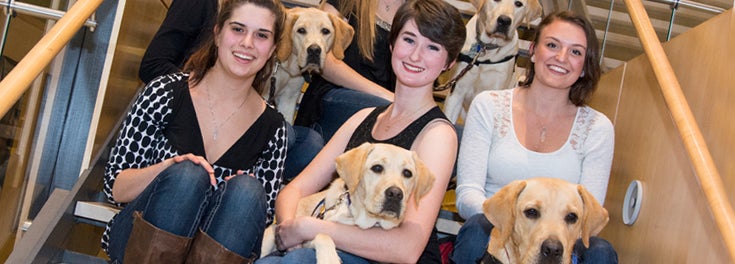
At URI, we are exceptionally proud of our labs. And that includes Pogo, Romeo, Tessi, and Katie—four yellow Lab puppies on their way to becoming service dogs, thanks to Caitlyn Landry and Kaitlin Kohut.
The two students, who met as freshman roommates, formed URI’s Puppy Raisers Club, and, along with students Katie LaBlue, Sarah Appleton, and Jenna Beauchemin, became certified through the non-profit Guiding Eyes for the Blind to train dogs to become guide dogs. Now the Labs spend every day with the students as part of their training.
“The dogs come to school with us—we take them to class if the teacher allows and we have a home base on campus where the dogs can stay if they aren’t allowed in a lab or other class,” said Landry, a junior in the pre-veterinary science program. The dogs are almost never alone, since most of the more than 40 other members of the Puppy Raisers—many of whom are in the process of becoming certified—are happy to serve as sitters or walk them around campus.
It’s not going to be easy to give up that dog, but you know they have a bigger purpose in life, that they’re going to completely change someone’s life for the better, and that’s personally rewarding.
The dogs and their trainers attend a formal class twice a month in Ledyard, Conn., with others in the area raising guide dogs. And every Thursday they gather for meetings of the Puppy Raisers in a URI classroom for what they call “a mini puppy class.”
The dogs are trained to be comfortable in all kinds of settings—responsive to their master regardless of whatever distractions they face. “Our job is to socialize them, to expose them to a variety of situations, and to teach them to be confident in all different scenarios,” said Landry. Recently they took the dogs to the Kingston train station to become acclimated to the sounds and activities there.
“At one of our meetings we put on blindfolds and had someone lead the dog while we held the leash to get an appreciation for what the dogs will be doing one day,” said Kohut, a junior wildlife conservation biology major. “To feel your dog have total control over where you’re going is something you’re not used to. You really have to trust them.”
After about 18 months of training, the dogs complete a test that determines their future career. Some will become guide dogs, while others become breeders of future guide dogs or continue their training to work with police as drug detectors or serve in a “healing autism” program. “The people at Guiding Eyes for the Blind read the dogs’ body language and determine their careers based on how they react to different situations,” said Kohut.
The students agree that it’s difficult to see a dog they’ve become attached to graduate and be placed elsewhere. But that’s exactly what the animals are being trained for.
“You know the dogs aren’t yours from the day you get them, so you see them in a different way, said Kohut. “It’s not going to be easy to give up that dog, but you know they have a bigger purpose in life, that they’re going to completely change someone’s life for the better, and that’s personally rewarding.”
Photo credit: Nora Lewis
